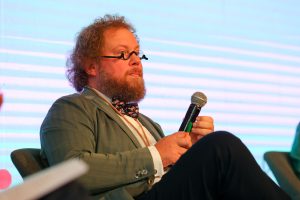Alliance sat down with Dimitry Kochenov, professor of law at the Central European University, on the sidelines of Konektor 2023 in Sarajevo. Here, we delve into the threats to the rule of law, how philanthropy plugs the gap and the recent failures of funders to back human rights…
Alliance: Firstly, give us a brief overview of what you’re covering at the Central European University?
 Dimitry: The rule of law is my main focus. Those trying to constraint those in power by legal means. There are plenty of negative examples of how it goes wrong in Europe, yet we forget that. When something goes wrong, it means that there’s a need to focus on funding, if you actually support the idea of ensuring democracy continues.
Dimitry: The rule of law is my main focus. Those trying to constraint those in power by legal means. There are plenty of negative examples of how it goes wrong in Europe, yet we forget that. When something goes wrong, it means that there’s a need to focus on funding, if you actually support the idea of ensuring democracy continues.
We’ve seen that in Bosnia and the Balkans, where it’s in trouble because the government tries to create fake NGOs which [then] absorb all government funding and then make sure that foreign funders don’t come. Then it becomes difficult to get foreign companies… which means that the good people, as it were, end up starved.
The whole sector is shrinking. We see this in Hungary and Poland. It’s the same.
The Open Society Foundation has been one of the biggest news recently, with reports of them pulling out of the region. What are the ramifications if this is the case?
It’s a disaster for many. The problems now in the field of the rule of law is much more acute than 15 or 20 years ago.
I’m a scholar, though this isn’t so much my speciality. At the session, everybody underlined that the Open Society Foundation’s money was much more flexible than institutional funding such as the European Commission, or other agencies of the EU. Which means that you can react easier, precisely to the smaller crisis and day-to-day tensions with the money which doesn’t come from the European Union.
Since the EU plans many years ahead, you need to pre-predict and anticipate changes in the rule of law which is difficult. It’s much more difficult for many to be effective without more flexible funding.
The next steps, in protecting the rule of law, will depend on how others step up and fill the niche that the OSF funding leaves.
Is that possible? For new actors to fill funding gaps that protect democracy?
There is such an overwhelming need that sooner or later it will have to be realised that it’s necessary to step up. Since the European Union cannot fill this void or fulfil the same function. It’s simply not designed to be as flexible. In terms of the time frame within which they do their planning. It’s unlikely that will change.
What are some of the issues in regards to philanthropy and protecting the rule of law that haven’t been widely discussed, that we should be thinking about?
There is not enough funding probably for hands-on projects which involve the use of law in order to push back against attacks against the rule of law, attacks against democracies. I see democracy as interlinking all over the world, because without legal constraints on what elected leaders can do, it’s impossible to ensure that democracy continues as a rotational system, are it where, or to understand how it will be abused.
But there are still plenty of legal means in Europe that could be deployed. You need strategic mitigation, you need inventive deployment of human rights and legal principles arguments at all levels – from the national to, Strasbourg. This is done a little bit, but not done enough. Civil society could, in theory, flood the autocrats with plenty of cases.
We see that in Poland there are thousands of cases about judicial decisions… since this is concerning to everybody. If we have suspicions that some of the judges were not lawfully appointed, it means that potentially all the decisions throughout their career could be reopened and questioned.
This has huge ramifications for the whole of the European Union, because in Europe there is a presumption that we honour each other’s decisions.
Once there is an odd one out, the whole system is significantly destabilised.
What we’ve heard this year’s conference here in Sarajevo is that top down traditional approach from philanthropy has by, in large, not fostered enough trust and accountability in the Balkans and Central Europe. Is trust, from the public about organisations that play a role in civic society, fragmenting?
It’s very interesting, because what emerged from the panel is that it’s very difficult to find an interlocutor since plenty of people on the ground have been misled, which is precisely the goal, by the fake NGOs created by governments precisely to obstruct the good work and go against the vital principles of law, which is indispensable for the survival democracy.
On trust, we are seeing in Poland the breaking of that in the judiciary, the last independence institution, with the appointment of judges that might not be acting as independent arbiters.
Rule of law is pertinent for Ukraine, if it joins the EU in the near future. If it does, is now the time to start rebuilding its rule of law and, also, using philanthropy to establish stronger law of rule in a post-war society?
The rule of law is the foundational principle, indispensable for meeting the criteria for joining the EU.
Joining the EU without making sure that rule of law is a functional principle is impossible. This is the test number one for the Ukrainian state after winning the war.
We cannot separate the accession to the European Union from the idea of victory [against Russia] because how do you win if your future is not guaranteed as a full member of the European family of nations?
For Ukraine, ending the war is essential.
What can the philanthropic sector improve on to ensure the rule of law is guaranteed?
Rule of law is never guaranteed, right? We always have to guarantee it. Actually, it’s a constant fight. This is what allows society to live its freedom. The balance is always shaking. Philanthropy plays a fundamental role. If you only rely on the state, and their funds, it becomes a one way process, which sidelines society in its fight for its own future… In the process of shaping its future.
Shafi Musaddique is news editor at Alliance magazine



Comments (0)